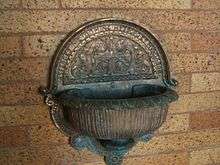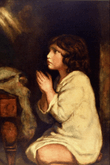Psalm 51
- This article uses the Hebrew (Masoretic) Psalms numbering. Psalm 51 in Septuagint/Vulgate numbering would correspond to Psalm 52 in Hebrew numbering.

Psalm 51 (Septuagint numbering: Psalm 50) is one of the Penitential Psalms.[1] It begins: "Have mercy on me, O God" (Latin Miserere mei, Deus , Ancient Greek: ἐλέησόν με ὁ θεός, translit. eléēsón me ho theós), for which it is traditionally known as the Miserere (or the Miserere mei; in Ancient Greek: Ἥ Ἐλεήμων, translit. HḖ Eleḗmōn), especially in musical settings. The psalm is frequently used in both Jewish and Christian liturgical traditions because of its spirit of humility and repentance.
Text
The text is divided into 19 verses. Verse 1 includes the introduction ("superscription"):
- "To the chief Musician, A Psalm of David, when Nathan the prophet came unto him, after he had gone in to Bathsheba." (KJV)
Robert Alter (2007) translates it less literally, making explicit what is only implicit in the words used: "...a David psalm, upon Nathan the prophet's coming to him when he had come to bed with Bathsheba." He comments: "The Hebrew verb used for both Nathan and David is 'to come to' [or 'into']', but in the former instance it refers to the prophet's entering the king's chambers, whereas the latter instance reflects its sexual sense."[2]:180 The Septuagint instead of "To the chief Musician" (נָצַח) has Ancient Greek: εἰς τὸ τέλος, translit. eis tò télos, lit. 'to the end'."[3]
The context is thus in David's iniquity in sending Uriah the Hittite to his death in order to possess his wife Bathsheba. The text of the psalm is David's plea for mercy and absolution from Sin:
- 1. Have mercy upon me, O God, according to thy lovingkindness: according unto the multitude of thy tender mercies blot out my transgressions.
- 2. Wash me throughly from mine iniquity, and cleanse me from my sin.
- 3. For I acknowledge my transgressions: and my sin is ever before me.
- 4. Against thee, thee only, have I sinned, and done this evil in thy sight: that thou mightest be justified when thou speakest, and be clear when thou judgest.
- 5. Behold, I was shapen in iniquity; and in sin did my mother conceive me.
- 6. Behold, thou desirest truth in the inward parts: and in the hidden part thou shalt make me to know wisdom.
- 7. Purge me with hyssop, and I shall be clean: wash me, and I shall be whiter than snow.
- 8. Make me to hear joy and gladness; that the bones which thou hast broken may rejoice.
- 9. Hide thy face from my sins, and blot out all mine iniquities.
- 10. Create in me a clean heart, O God; and renew a right spirit within me.
- 11. Cast me not away from thy presence; and take not thy holy spirit from me.
- 12. Restore unto me the joy of thy salvation; and uphold me with thy free spirit.
- 13. Then will I teach transgressors thy ways; and sinners shall be converted unto thee.
- 14. Deliver me from bloodguiltiness, O God, thou God of my salvation: and my tongue shall sing aloud of thy righteousness.
- 15. O Lord, open thou my lips; and my mouth shall shew forth thy praise.
- 16. For thou desirest not sacrifice; else would I give it: thou delightest not in burnt offering.
- 17. The sacrifices of God are a broken spirit: a broken and a contrite heart, O God, thou wilt not despise.
- 18. Do good in thy good pleasure unto Zion: build thou the walls of Jerusalem.
- 19. Then shalt thou be pleased with the sacrifices of righteousness, with burnt offering and whole burnt offering: then shall they offer bullocks upon thine altar.
Robert Alter has "Do not fling me from Your presence" for verse 11, commenting: "as elsewhere, this Hebrew verb has a connotation of violent action for which the conventional translation of it as 'cast' is too tame."[2]:182
Parallels between the Ancient Egyptian ritual text Opening of the mouth ceremony and Psalm 51 are pointed out in "Psalm 51 and the 'Opening of the Mouth' Ceremony," by Benjamin Urrutia, Scripta Hierosolymitana: Publications of the Hebrew University of Jerusalem, volume 28, pages 222–223 (1982). The parallels include:
- Mentions of ritual washing with special herbs (Psalm 51:2,7).
- Restoration of broken bones (verse 8).
- "O Lord, open thou my lips" (verse 15).
- Sacrifices (verses 16,17, 19).
Judaism
In Judaism, several verses from this psalm are given prominence:
- The entire psalm is recited in the Arizal's rite of the bedtime Shema on weekdays, and is also part of the regular Tikkun Hatzot prayers.
- Verse 13 (11 in the KJV), "Cast me not away from thy presence...", forms a central part of the Selihot services
- Verse 17 (15 in the KJV), "O Lord, open thou my lips...", is recited as a preface to the Amida, the central prayer in Jewish services.
- Verse 20 (18 in the KJV), "Do good in thy will unto Zion...", is recited in the ashkenazic liturgy as the Torah is removed from the Ark before being read on Sabbath and festivals.[4]
- The psalm is recited along with Parashat Para, the Torah portion describing the ritual of the "red heifer" that is read in preparation for Passover.[5]
Eastern Christianity
The most frequently used psalm in the Eastern Orthodox and Byzantine Catholic Churches, Psalm 50 (Septuagint numbering) it is called in the "Greek language Ἥ Ἐλεήμων" E Eeleḯmon, and begins in "Greek Ἐλέησόν με, ὁ Θεός" Eléïsón me, o Theós.
In the Daily Office it is recited in each of three aggregates (evening, morning and noonday).
In the Divine Liturgy it is recited by the deacon while he censing the entire church at the conclusion of the Proskomedie. Which is also known as killing Satan. It is also a part of many sacraments and other services, notably, as a penitential psalm, during the Mystery of Repentance.
In the Agpeya, Coptic Church's book of hours, it is recited at every office throughout the day as a prayer of confession and repentance.
Western Christianity
In Western Christianity, Psalm 51 (using the Masoretic numbering) is also used liturgically.
In the Roman Catholic Church this psalm may be assigned by a priest to a penitent as a penance after Confession. Verse 7 of the psalm is traditionally sung as the priest sprinkles holy water over the congregation before Mass, in a rite known as the Asperges me, the first two words of the verse in Latin. This reference lends a striking significance to the Mass as Sacrifice, given that Hyssop was used for the smearing of blood on the lintels at the first Passover.
In the Divine Office, it was traditionally said at Lauds on all ferias; the 1911 reform restricted this use to the ferias of Advent and Lent. It is otherwise said as part of the weekly cycle on Wednesday at Matins. In the Liturgy of the Hours, it is prayed during Lauds (Morning Prayer) every Friday.
Psalm 51 was recited by Lady Jane Grey before her beheading at the Tower of London in 1554.
A section of verse 17 is often used as the invitatory antiphon the Liturgy of the Hours.
Parts of Psalm 51 are used as a responsorial psalm in both the Revised Common Lectionary and the Roman Catholic Lectionary on Ash Wednesday and on other days.
Musical settings
The Miserere was a frequently used text in Catholic liturgical music before the Second Vatican Council. Most of the settings, which are often used at Tenebrae, are in a simple falsobordone style. During the Renaissance many composers wrote settings. The earliest known polyphonic setting, probably dating from the 1480s, is by Johannes Martini, a composer working in the Este court in Ferrara.[6] The extended polyphonic setting by Josquin des Prez, probably written in 1503/1504 in Ferrara, was likely inspired by the prison meditation Infelix ego by Girolamo Savonarola, who had been burned at the stake just five years before. Later in the 16th century Orlande de Lassus wrote an elaborate setting as part of his Penitential Psalms, and Palestrina, Andrea Gabrieli, Giovanni Gabrieli, and Carlo Gesualdo also wrote settings.[7] Antonio Vivaldi may have written a setting or settings, but such composition(s) have been lost, with only two introductory motets remaining.
One of the best-known settings of the Miserere is the 17th century version by Roman School composer Gregorio Allegri.[8] According to a famous story, Wolfgang Amadeus Mozart, aged only fourteen, heard the piece performed once, on April 11, 1770, and after going back to his lodging for the night was able to write out the entire score from memory.[8] He went back a day or two later with his draft to correct some errors.[9] That the final chorus comprises a ten-part harmony underscores the prodigiousness of the young Mozart's musical genius. The piece is also noteworthy in having numerous high Cs in the treble solos.
Settings were also written by Costanzo Festa, Johann Sebastian Bach, Giovanni Battista Pergolesi and Saverio Selecchy. Tilge, Höchster, meine Sünden (BWV 1083) is a Bach cantata based on Psalm 51. Modern composers who have written notable settings of the Miserere include Michael Nyman, Arvo Pärt, and James MacMillan.
The Antestor song "Mercy Lord", from the album Martyrium (1994), also cites Psalm 51. The song "Restore To Me" by Mac Powell and Candi Pearson-Shelton from Glory Revealed (2007) includes lines from Psalm 51. In the Philippines, the Bukas Palad Music Ministry includes their own version of "Miserere" in their album "Christify" (2010). References in secular popular music include "In Manus Tuas" (Salvation 2003) by the group Funeral Mist, and "White As Snow" (Winter 2008) by Jon Foreman.
See also
Notes
- ↑

- 1 2 Alter, Robert (2007). The Book of Psalms: a translation with commentary. W.W.Norton. ISBN 978-0-393-06226-7.
- ↑ translated from the Greek Septuagint by the Holy Transfiguration Monastery. (1974) [1987]. The Psalter According to the Seventy. Boston MA: Holy Transfiguration Monastery. p. 100. ISBN 0-943405-00-9.
- ↑ The Complete Artscroll Siddur, p.432, note 7
- ↑ The Artscroll Tehillim page 329
- ↑ Macey, p. 185
- ↑ Caldwell, Grove
- 1 2

- ↑ Sadie, Grove; Boorman, Grove
References
- John Caldwell: "Miserere", Stanley Boorman, "Sources: MS", Stanley Sadie, "Mozart, Wolfgang Amadeus"; Grove Music Online, ed. L. Macy (Accessed November 25, 2006), (subscription required)
- Patrick Macey, Bonfire Songs: Savonarola's Musical Legacy. Oxford, Clarendon Press. 1998. ISBN 0-19-816669-9
External links
| Look up miserere in Wiktionary, the free dictionary. |
| Wikisource has original text related to this article: |
| Wikisource has the text of the 1913 Catholic Encyclopedia article Miserere. |

- Hebrew text, translation, transliteration, recording on the Zemirot Database
- Tehillim — Psalms 51 (Judaica Press) translation with Rashi's commentary at Chabad.org
